#social theory
Text
One thing that doesn't get brought up enough in discussions of how the man-hating variety of radical feminism is based in homophobia. Like does no one remember when lesbian separatist radfems tried to claim that all gay men are predators? I think that a lot of people on tumblr who haven't really unlearned that rhetoric spread it unknowingly and will say shit like "well I'm not like those other misandrists, I don't hate gay men because they're gay I hate them because they're men!"
Ok but the effect is the same. Patriarchal structures of manhood and masculinity oppress queer men and men of color with their manhood/masculinity as a modifier. I do not like the word misandry for many reasons but the patriarchal role of a man is more than just the absence of womanhood or the position of power over others.
Butches, trans men, and some nonbinary people are all groups that do not generally have access to male privilege, but we still have the modifier of "male" factor into our oppression. All marginalized men have this modifier to an extent. Gay men are not simply oppressed for being gay, they are oppressed for being gay men specifically and occupying that position in society. While most cis gay men have access to cis and male privilege, they are still oppressed for how their gender and agab intersects with their gay identity.
What I mean when I talk about marginalized manhood is the common threads between different oppressions of minority male identities. It doesn't imply that misandry is real or that misogyny isn't. I don't know if there's a particular name for this type of theory/thought, but it perfectly explains how trans men are oppressed as a type of marginalized man while still experiencing misogyny.
Binary, radfem thinking makes people believe that marginalized manhood is characterized by the absence of misogyny when this could not be further from the truth. Woman—man is not only a bad way of looking at gender identity, but is also not how social positionality works. There are ways to explain how trans and intersex men are able to experience misogyny and marginalized manhood at the same time, but that requires us to quit thinking that the two social positional genders are "male" and "non-man".
#wentz.txt#intersectional feminism#social theory#long post#feminism#men's liberation#transandrophobia
583 notes
·
View notes
Text
It's wild to me how some able-bodied people only think of disabled culture as a concept and they haven't ever actually experienced it. To me the biggest tell that somebody has never experienced disabled culture is their lack of knowledge about something I call Societal Manufactured Disability Theory.
This theory posits that an aspect of disability is manufactured by societal norms, stigmas and labeling.
People with disabilities like myself will tell you that people do treat you differently based solely upon the fact that you are disabled. When my hand writing is too messy to read do to Dysgraphia people assume I'm not trying hard enough to be neat, and if I'm lazy enough to slack with hand writing I must always be lazy. When I tell people I have Dyslexia they think I'm less intelligent, unable to read or incapable of understanding the written word. When I tell people I have a connective tissue disorder which is an invisible disability they think I'm a liar, scheming to take resources away from "real disabled people".
The societal norm here in America is to push forward, laziness is not an option we see it repeatedly in the rhetoric surrounding young people. News sources constantly talking about how "no one wants to work these days" or "young people are taking everything for granted".
There is a huge stigma around having Dyslexia that most people don't notice. In American society where we have a 79% literacy rate it is expected that you can read, so when you can't or you have trouble people think you have a lower IQ. Dyslexia can be genetic so I'm actually a fourth generation Dyslexic from my dad's side with all of them men being the ones to pass it down. My dad has always said that my great grandfather had no support for his Dyslexia, nobody cared and in fact the term Dyslexia was only coined in 1887. When my dad went to school they attempted to alleviate some of the symptoms of Dyslexia by making him watch his hands as he crawled on the floor, believing that the root of the problem was in a lack of eye coordination. To this day I and many other Dyslexics will avoid talking about our diagnosis because of the stigma behind it. I have had many experiences in my life where as soon as people learn that I am Dyslexic they assume that I can't spell anything or that they need to read everything to me. That's what stigma does, it makes people hide away just so they can live in peace and be respected.
It is extremely common for people with invisible disabilities to be labeled as liars, this is mostly due to a lack of education and representation. The general public's idea of disability is limited, but the truth is that disability is one of the most dynamic aspects of human beings. Invisible and dynamic disabilities make up the majority of disabilities; in fact, 1 out of every 3 Americans is in fact disabled. When people see me, a young, healthy-looking man, they never think I'm disabled. If I tell them I am, they may think I am lying. People generally do not like liars, and having such a label attached to your name can be detrimental to your social integration.
You can see that none of those setbacks I mentioned are symptoms of my disabilities. The perceived deviance, stigma, and labeling are not things you'll find on a medical report. However, they do harm me socially and potentially medically when it comes to stigma; these things disable me. Thus, part of my struggle as a disabled person is manufactured by society itself, in the norms we hold and the way we treat others.
I have come to that conclusion repeatedly, as have almost every other disabled person. It's a conclusion that is often reached in the community as a whole. However, it is in able-bodied culture where these stigmas, labels, and perceived attacks originate. So, if someone is completely averse to accepting the Societal Manufactured Disability Theory, it suggests that they have probably never fully been a part of any aspect of disability culture.
#physical disability#learning disability#learning disabilities#disabled#disability#disabilties#disabled culture#disabled community#essay#ableism#stigma#society#sociology#hypermobile ehlers danlos#hypermobile eds#dyslexia#dysgraphia#connective tissue disorder#writing#learning#discrimination#theory#social justice#social theory#text post#education#anthropology#rant#rant post
22 notes
·
View notes
Text
The Power and Purpose of Strikes
Simone Weil, the philosopher/anarchist/mystic, describing an ideal political future for France after WW2, lamented that trade unions have become primarily concerned with wages. This might seem strange to us now, when even this activity is so contested by conservatives, but Weil saw it as playing too much into the capitalist spirit.
She saw this as just one of trade unions’, and the worst of the lot, because it encourages workers to think about personal monetary gain rather than justice, solidarity, and even their own needs beyond the material. It also risks the union becoming institutionalised through frequent direct interactions with established economic forces. Again, this will sound weird today, given how unions fighting for wages represent one of the few remaining avenues for working class justice, and yeah Weil was a Catholic with strong convictions about the importance of moralism, but I think fundamentally she had higher hopes than we can easily imagine today.
I think a lot of people sense the truth of what she says today - though unfortunately it’s usually conservatives, who would turn back on it immediately if they recognised what it was they were saying. You see it when they say “Why are train drivers striking? Why are writers striking? Why do they think they deserve more than nurses, or posties, or actors?” And of course, the answer is: “They should strike too!” (As some of them now are 🎉). But it’s true that the narrow focus on wages does foster a sort of competitive individualism which can undermine solidarity with other industries. This means that a more revolutionary conception of unions is needed, which is not what these critics have in mind, but it is what Simone Weil has in mind.
What Weil sees in trade unions is the potential for fostering community, freedom of intellectual and spiritual thought, and a degree of independence from capitalism, all of which amount to a greater degree of what she calls ‘rootedness’ - something involving confidence in truth, having material needs met, security in community, and relative freedom (among other things). She saw them as being able to foster solidarity to meet workers’ need for community, free them from the corrupting influence of monetary concerns, and fight for justice as a group. She also hoped that they could provide a space for freedom of thought, to avoid the fetishisation of community she saw in both the French and Russian revolutions.
Trade unions then should not merely concern themselves with accumulating resources, but also with accumulating time and freedom - with the expansion of what Henri Lefebvre called everyday life, the time in which we are free to do what we want and create new types of experiences. When we have enough of it, we can build our own institutions free from capitalist influence which can form the infrastructure for disruptive situations. This can be mutual aid groups, creative projects, intellectual and spiritual communities, and reimaginings of what it means to work, through permablitzing, learning crafts, and starting co-operatives.
The ideal version of this is the general strike. Walter Benjamin described the general strike as a form of divine violence, violence which acts instantaneously, bloodlessly, without coercion. Rather than sort of blackmailing capitalists, as most strikes do, the general strike is (ideally) a complete disengagement with the entire capitalist system. It asks nothing of it, and simply makes it irrelevant by building entirely new social relations in its place. This is not at all feasible with where we are at the moment, but I like to think that it can be used as an inspiration for incorporating more utopian ideas into our more limited actions, all of which are still so radical in this current climate.
#philosophy#sociology#social theory#anarchism#unions#trade unions#wga strike#sag strike#writers strike#ups strike#actors strike#train strikes#worker solidarity#solidarity#freedom#freedom of thought#intellectual freedom#communism#simone weil#walter benjamin#henri lefebvre#mutual aid#situationism
85 notes
·
View notes
Text
“No Means No” Is Not Enough
CW: Entire post may be distressing. Talking about consent.
It’s a good principle, but it’s not enough by itself with no other supporting principle.
Why?
There are so many ways people say “no” or “I’m uncomfortable,” without actually SAYING those exact words.
Think about these things: Coercion, body language, subliminal cues, intoxication, unconsciousness.....
This is going to get triggering because I struggle to sugar coat topics like this. Here we go --
What stops somebody from emotionally, psychologically, or verbally coercing someone into doing something they don't want to do? Nothing. What stops someone from asking the same exact question SO many times that the subject of the questions just gives in and gives them what they want so they can be left alone? N O T H I N G.
Someone can say “no” in any and every way imaginable, yet all that’s needed is ONE “yes.” Nothing stops people from pressuring (coercing) another person into giving just that one “yes” in order to justify obtaining “consent,” regardless of if they have received 50 “no’s” in the past.
Coercion is not consent.
Few states have laws in place that include coercion in their legal definition of s3xual assault.
Moving on. Body Language.
Body language can say “no” in many ways. If someone tenses up, does not reciprocate the same body language, moves or shifts their body away from someone, moves another person’s hands off of them or to a different area, if they turn their head away to dodge a kiss, if they keep a good distance between themselves and others....
Those are a few examples of a non-verbal “no” or “I’m uncomfortable.” Of course, situation varies. I know many neurospicy people like myself might do some of these things without meaning to indicate discomfort. Body language can indicate many things and can vary between individuals, which is why only body language by itself is also not enough in consent conversations. There are symbols in society that most people understand as “no.” For example, waving your hand in front of your throat to say “cut it out,” (aka, stop) holding a finger or hand up to say “wait,” or “stop, slow down, etc.” Shaking your head “no,” creating distance between yourself and others...
All of these are examples of “no,” yet they aren't talked about nearly enough. You do not need a verbal “no” in order to know that you do not have consent. But also, it’s important to have conversations with partners. For example, if you struggle with body language or have unconscious non-verbal reactions to certain things like touch... It’s good to make partners aware of them so they know what you’re communicating (or not purposely trying to communicate)
Nothing stops someone from saying “well they didn't SAY no,” and that is exactly why we need to shift the conversation of consent away from or perhaps deeper into “no means no.”
Subliminal Cues
In real life, people have anxiety, struggle socially, struggle with self-assertion, and many many things that can affect someone’s ability to straight up say “no.”
People pleasers like myself might try “letting someone down easy” without saying “no” specifically. OR, someone might actually be mean but still not say the word “no.”
For example, in movies we’ll hear “I’d rather die,” “aha, ew.” or “In your dreams,” do these mean no? Yes. If someone says they’d rather die than hookup, it’s undoubtably a no.
In real life, though... “No thanks,” “not right now,” “I’m in a relationship,” “I’m not interested,” THOSE ARE ALL A NO WITHOUT A STRAIGHT UP “NO”
I don’t care how nice somebody is about saying no. If they say “no thanks,” or “not right now,” or “not interested...” They are still saying no. They’re just catering to someone’s feelings and trying not to be rude. Also, none of those things mean “maybe if you try to convince me,” either.
Politeness does not = convince me or maybe later
Intoxication and Unconsciousness
Nothing stops people from saying “they didn't say no,” to justify non-consent against an intoxicated or unconscious person if we continue to ONLY focus on “no means no” and even “yes means yes.”
Has nobody heard those nasty a$$ “jokes” some “men” tell? That pretty much say that if someone doesn't have the ability to say no then it’s free reign?
I think that should say enough about why there needs to be a shift in the conversation.
A few things I have to add...
If you’re touching someone and they move your hand to a different part of their body, do not move your hand back to where they removed it from. They said no.
Consent to kiss someone does not give you consent to do ANYTHING you want. Consent to have s3x with someone also does not indicate that you have free reign to do whatever you want without asking.
If somebody dodges a kiss, don’t keep trying. Don’t throw a pity party to make them feel guilty for saying no either.
!!!!!!!!!!YOU HAVE THE RIGHT TO BE A BITCH TO ASSERT YOURSELF!!!!!!!!
YOU ALSO HAVE THE RIGHT TO A PRIMAL LEVEL OF VIOLENCE AGAINST PEOPLE WHO WON’T STOP
Do noooot ASSUME what somebody is into. Do not assume someone’s kinks. Absolutely do not assume everybody enjoys having their hair pulled, face or a$$ slapped, being choked. Assume nothing. Expect nothing.
To Recap...
Pressuring someone into giving consent is not consent.
A non-verbal “no” is still a no.
People can subliminally say no or yes.
If someone doesn't have the ability to say or indicate “no,” it’s always a no.
#consent#no means no#no#sexuality#sociology#society#social theory#social science#social justice#social issues#rights#human rights#trans rights#womens rights#abuse is abuse#mental health#self defense#self improvement
197 notes
·
View notes
Text
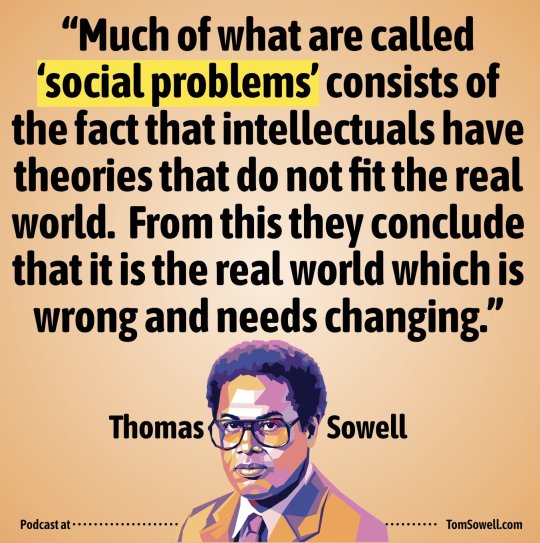
"Much of what are called 'social problems' consists of the fact that intellectuals have theories that do not fit the real world. From this they conclude that it is the real world which is wrong and needs changing."
-- Thomas Sowell
Mostly because ivory tower academics - such as DiAngelo, Kendi, Butler, Crenshaw and others - have never actually lived in the real world, much less study it.
The social theories that plague us today are essentially arguments from ignorance.
44 notes
·
View notes
Text
Quick and dirty power/structure/agency meta for y’all because my brain is going HAYWIRE at how Kinnporsche ended.
I’ve seen several posts explaining why Porsche becoming the head of the minor family isn’t the power move that it first appears (see posts from @atlasshrugd here and @deliciouswastelandgoddess here).
I fully agree. A big thematic element throughout this season has been Structure vs. Agency -- basically a question of freewill, self-determination, the ability to bring about what YOU want to happen, and the limitations that are placed on those things by the context you find yourself in (see my full KP meta of this here).
Throughout the series, we’ve seen Porsche lose more and more agency. First, as a bodyguard he is severely constrained in nearly every way. Where he can go, what he can do, what he can eat, who he can have contact with, all are limited in the extreme. Yes, Porsche technically CHOOSES to be a bodyguard, but his list of choices is pretty damn proscribed. Is it really a choice, if there are two options and one puts you on the mafia’s bad side?
He gains a bit of that back when he wins Kinn’s affection, and later gets Korn’s blessing as Kinn’s boyfriend. He gets a phone (only to call Kinn, ofc), permission to call and visit his brother, etc.
Slowly, though, Korn is amassing all these different ways of controlling Porsche’s options. Chay gets brought into the fold. We find out Korn has been keeping Porsche’s mom locked in the attic. And obviously Korn has a great deal of influence over Kinn.
In the finale, Korn makes his big power play of the season and assigns Porsche as the head of the minor family. Note that he doesn’t ASK Porsche. He simply decides, and Porsche acquiesces.
And the thing is, this COULD be Porsche gaining a good deal of agency and power! IF WE KNEW THAT PORSCHE ACTUALLY WANTED THAT POSITION (or, uhhhh, would be any good at it...).
We’re not given any insight into Porsche’s thought process. He doesn’t volunteer. We never see him debate it, waver, gladly accept. Anything.
As @yeetlegay and I have been discussing, the choice is fundamental--is this something that Porsche WANTS, and therefore accepting it is an act of agency that allows Porsche to fulfill his own desire?
Or is Porsche only accepting it because it’s what he thinks is necessary to get the other things he wants: namely Kinn, access to his mom, and protection for Chay?
Is it even really a choice, when one option has the very real potential of tearing you away from those you love?
Fundamentally, would Porsche choose to be the head of the minor family if he could keep Kinn, his mom, and Chay safe and by his side regardless of his choice?
Korn is pulling Porsche further and further into the structure, and into his game. He’s the puppet master pulling the strings, giving power over the minor family to someone he can CONTROL. He is amassing everything he needs to constrain Porsche’s agency and choices; he always had Porsche’s mom, but now he has his brother and, serendipitously for him, Kinn whom Porsche loves.
The noose is tightening, and we don’t even know if Porsche KNOWS that it is.
I think this is, actually, a BRILLIANT set-up for a second season; Porsche discovering that he’s stepping further and further into the trap. Doors are closing all around him. How much of your agency are you willing to give up, for love? How much of yourself can you stand to lose, and how much can your beloved stand to SEE you lose? Can you have both love and freewill, in this violent world?
It’s also a great parallel to what’s happening with Vegas and Pete, who have been yeeted out of the system and, in some ways, CHOSEN that (Pete by leaving the main family and Vegas by choosing to live despite being stripped of his position/power). They have a great deal of self-determination at the moment (...as long as no one drags them back in. Ohhh noooo, who would do that?? I WONDER).
I could see a nice balancing act of Vegas and Pete being drawn back into the structure/game, while Kinn and Porsche struggle to escape or at least establish their own agency. Both couples will need to cement their own power, outside of Korn’s chessboard, and it looks like a perfect narrative set up for them to do it by working together from opposite ends of the spectrum.
#kinnporsche#kinnporsche meta#social theory#power structure and agency#kinnporsche the series#Porsche walking down that hallway in his mafia boss suit looked to me like a cartoon animal wandering under a box propped up with a stick
282 notes
·
View notes
Text
The racial aspects of Sci Fi, Fantasy and other forms media
NO. 1
One of the blog posts I have written before was titled ‘Mean World Syndrome’, which talked about how race and media affects everyone on a global scale. Racial aspects of sci-fi, fantasy, and other forms of media have long been a source of controversy. From the stereotypes of aliens in Star Trek to the whitewashing of characters in movies like Avatar, Prince of Persia, etc. these issues have been a major source of discussion in the media landscape. In many cases, racial stereotypes have been used to create a sense of ‘otherness’ for the characters of color in order to reinforce a sense of white superiority. This has led to criticism from fans, activists, and academics who have called for more representation of people of color in sci-fi, fantasy, and other forms of media.
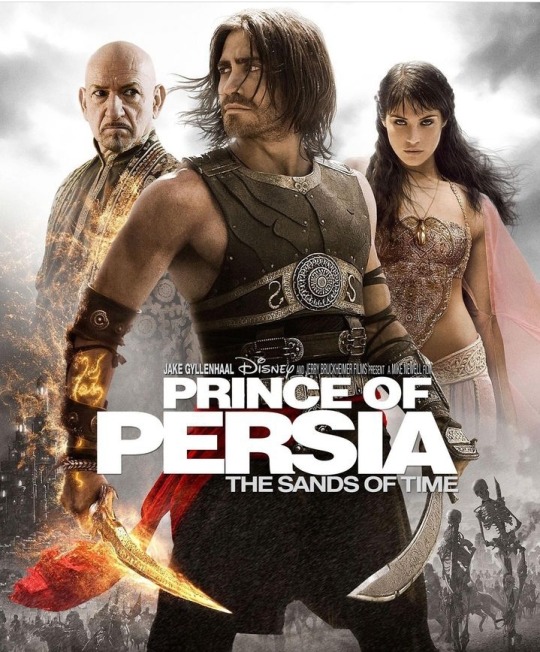

NO. 2
In the entertainment business, inclusivity is hard to come by, and in some cases, the representation of characters of color in these genres is inadequate and often offensive. Characters of color are often relegated to the sidelines and made to serve as the backdrop to white characters’ stories, or they are depicted as tokens and stereotypes. This lack of meaningful representation has led to a push for more diverse casts in sci-fi, fantasy, and other forms of media. ‘‘Like many social sciences, international/intercultural/interethnic communication and media studies are primarily an Anglo-American media images have always been critically dissected, often by scholars with some kind of privileged tie to other cultures—Most makers of these blockbusters are mostly white males with English as their mother tongue, mutli-millionaires or aspiring to become one as soon as possible. They usually internalize a mid-Atlantic view of global history and geography, its central myths and legends. So many blockbusters remain ethnocentric, even today—they tend to make non-Westerners look at the world through Western eyes.’’
NO.3
In addition to representation in the stories themselves, the casting of actors to bring these characters to life has been another source of debate. Many actors of color have argued that they are often typecast into roles that are stereotypical or that do not reflect the true diversity of the world. Films or TV shows with fantasy/sci-fi themes on Netflix, like Chambers or Raising Dion are not being properly advertised because, like Inclusive Advertising: What’s Holding the Industry Back? claims, ‘‘The industry itself is not diverse: The advertising industry — across the ecosystem and at all levels — is not representative, which is itself a barrier to creating representative and inclusive content. Only 19% of in-house and 23% of agency survey respondents reported that their leader almost always considers the demographic diversity of their team when developing content. That, and individuals (in these marketing companies) lack awareness of and access to the knowledge, skills, resources, and tools to create representative and inclusive content. Individuals are confident in their ability to create representative and inclusive content, but only if provided with adequate tools and resources.’’
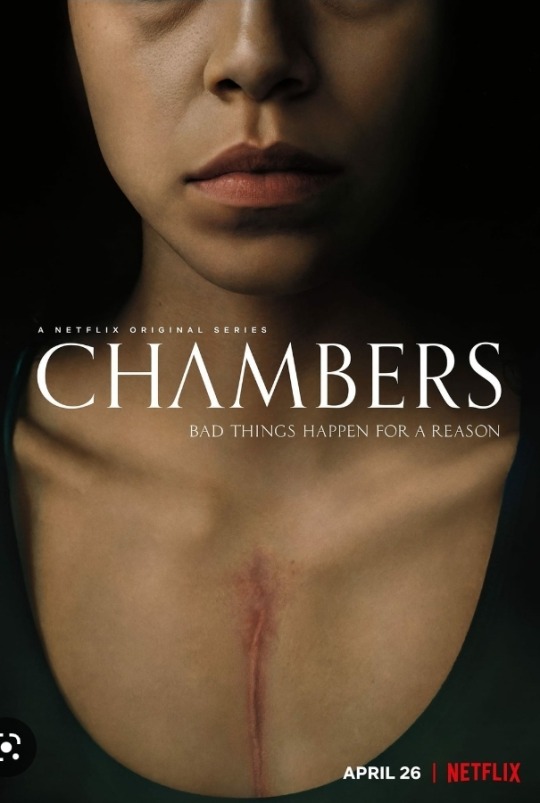

NO. 4
Of course, there will always be people who dislike seeing a more diverse setting, especially against the established order of Western ‘‘whiteness’’ ideologies. Ultimately, the best way to ensure diversity in these genres is to continue to create stories that feature diverse characters and cultures. If authors, producers, and casting directors make a conscious effort to create more imaginative stories that are inclusive and reflective of the real world, then audiences will be able to experience a more authentic and meaningful experience.
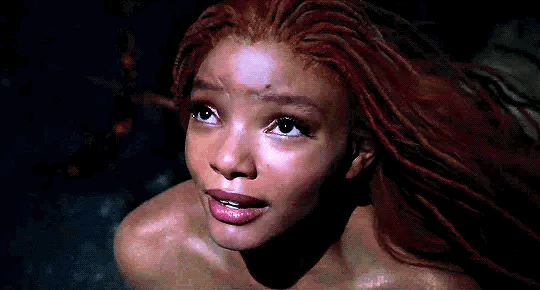
#racemedia#race in media#characters#inclusivity#social issues#anime#stereotypes#fandoms#identity#social justice#social theory#cultures#colonialism#politics
88 notes
·
View notes
Text
I feel like there’s a difference between a girl who is popular and the popular girls, a girl who is popular is a girl who people like and think is a cool person, whereas a popular girl is a girl at the *top* of the social hierarchy, no one can beat them in an argument because they just have too much power, they don’t have to be liked they just have to be at the *top* of the social hierarchy.
5 notes
·
View notes
Text
When I went to the gym this afternoon and saw all the patients with their broken or malformed bodies being manipulated and caressed by the physiotherapists, something in me changed.
I thought, if you only watch the news and tv shows, you would have the impression that the world is only a harsh place, inhabited by money-grubbing and narcissistic individuals. When you see the mutual work done in the gym, it is a place of beauty, collaboration and respect.
Many of the patients I have spoken to are aware that those on the outside world are appalled, if not afraid, of those with disabilities. It is as if having a disability were contagious, which it is.
Most of us at some time in our lives will suffer from a catastrophic health crisis which will make us feel isolated and afraid. But it is as if we want to believe that we live in a world of many healthy and well-functioning people. We do not.
We have convinced ourselves that there is a standard of the well and effective human being. This is deception, an ideology, which is deliberately misleading. It means that we cannot always see the disabled, just as in other circumstances we fail to see others of colour, or queers.
We should give up the standardised view of the world for a more complex view, which will include more people.
- author Hanif Kureishi, continuing to (often bluntly) journal life in hospital, in the wake of a paralyzing fall [x]
#hanif kureishi#living with disability#social theory#trauma#not perhaps the most interesting bit of his current writing#but the sort of thing#that bears reiterating
21 notes
·
View notes
Text
#automation#late stage capitalism#socialism#universal basic income#technology#ai#artificial intelligence#social theory#social transformation#aaron benanav
16 notes
·
View notes
Text
"academia is one of the many systems that perpetuates the notion that one form of white, upper-class, cisgender knowledge is more sophisticated than other forms of knowledge and theory" and "there are poor, non-white, trans, and marginalized researchers who are doing good work" are statements that can and should coexist.
45 notes
·
View notes
Text
Black Mass by John Gray
'To remain within the boundaries of what is believed to be practicable is to abdicate hope and adopt an attitude of passive acceptance that amounts to complicity with oppression.'
On the thinking behind utopian projects
'Whether religious or not the Right understood that the flaws of human nature could not be overcome.'
On conservatives attitude towards utopian ideals, particularly pre-Bush junior.
'Utopianism does not cause totalitarianism - for a totalitarian regime to come into being many other factors are necessary - but totalitarianism follows whenever the dream of a life without conflict is consistently pursued by the use of state power.'
This appears to be the central idea of the book so far. That goals of a perfect society where there is no friction cannot be achieved and are a fundamental misunderstanding of human nature. Sincerely trying to achieve such a society leads to horror and terror.
Some quotes from Black Mass by John Gray that has really got me thinking and I'm mostly liking it although I'm not halfway through yet. Been a while since I've enjoyed a book so much that I've folded in corners to mark bits I like. I've not seen much comment on this book (partially through choice) but from what I've read so far I can imagine it had a lot of critics when it came out in 2007.
#book quotes#currently reading#books and reading#books#social theory#political theory#actually autistic
2 notes
·
View notes
Text
I visited a friend in Oxford this weekend, and having read Babel last year, RF Kuang’s incredible historical fantasy about the role of universities in British colonialism, it was impossible for me to admire the architecture there without thinking about its imperial legacy and persisting imperialist function, and the effect it had on me, on Oxford residents, and on Oxford students. I didn’t take any pictures because I always forget to do that, so enjoy these ones I found on Google. 🙃

The main Bodleian building is probably the most iconic from Oxford, and it’s impossible to communicate the absolute grandeur of its presence when you’re actually there. It’s also perhaps the building most similar in both form and function to Babel in RF Kuang’s story, it being also a central towering library. This is just one of several imposing and beautiful old buildings there though, all of which inescapably give you the impression of being part of - or at least in the presence of - a mighty, cultured civilisation. My friend said she felt the same thing in Durham, where we studied, but Oxford is on a whole other level.

The Oxford motto is apparently “fortis est veritas”, or “the truth is strong”, which I did see around on various buildings. I couldn’t believe how on the nose it was. It perfectly encapsulates what Kuang is critiquing, and they emblazon it proudly on their city: we use this knowledge to enrich ourselves through conquest; this beauty you see around you, this skilled craftsmanship, is both the product and the tool of empire. Knowledge and material is taken from other lands, developed by those with the privilege not to be concerned by more immediate things like food and shelter, and then used to conquer more lands.


I think it was the statues that really affected me though. There was something so intimidating about being surrounded by all these figures of “great men”. It’s hard not to feel fundamentally inferior. But what must it be like to see them when you know that you’ve been invited to join their number, when you’re a student in their institution? I can’t imagine it’s freeing. I have to think that - unless you resist it, as I’m sure many do to varying degrees - it feels like a terrifying pressure to conform to the precise idea of greatness embodied and projected by those statues - a European, masculine, individualist, imperialist one. It’s no wonder it’s often a very specific type of person who comes out of Oxford. It’s no wonder so many of our politicians are from there.
If you haven’t read Babel, I can’t recommend it enough. I read Kuang’s new book, Yellowface, in a single sitting yesterday too, so read that one too. 😂 They’re both excellent critiques of intellectual culture while also being incredibly gripping reads. They combine nuanced characters with blunt didacticism, which in Yellowface in particular she reflects on and defends as a style, in a way that feels so edifying once you get over the popular prejudice against didacticism. Maybe we should be uncompromising in certain truths about the evils of colonialism, racism, and capitalism, ya know?
Both books were advertised to an almost obnoxious degree in every bookshop there, and my friend said everyone she talked to on her short course was talking about Babel, so I like to think there’s hope.
#philosophy#sociology#social theory#rf kuang#babel rf kuang#babel#yellowface#henri lefebvre#geography#oxford#university of oxford#oxford university#academia#literature#books#colonial architecture#colonialism#imperialism#dark academia#bookblr
28 notes
·
View notes
Quote
The individual, his character, and his fate are for real. Each individual is different from every other individual who has ever lived or who will ever live. A human life is a dramatic and irreversible movement from birth to death, surrounded by mystery and overshadowed by chance.
Roberto Mangabeira Unger, The Self Awakened: Pragmatism Unbound
#quote#Unger#Roberto Mangabeira Unger#theory#philosophy#social theory#life#human being#self#individual#human#psychology#social#society
27 notes
·
View notes
Photo
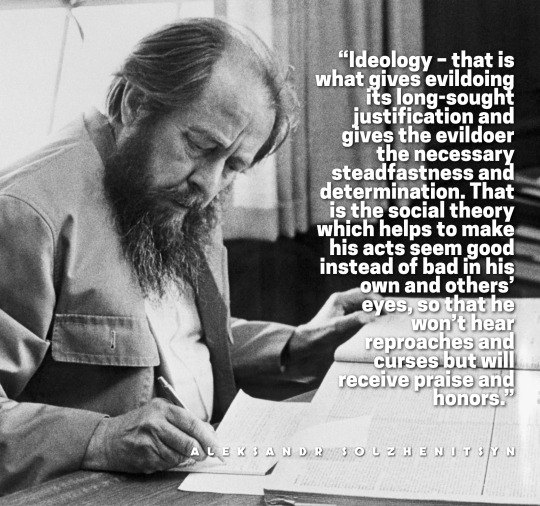
“Ideology – that is what gives evildoing its long-sought justification and gives the evildoer the necessary steadfastness and determination. That is the social theory which helps to make his acts seem good instead of bad in his own and others’ eyes, so that he won’t hear reproaches and curses but will receive praise and honors.”
-- Aleksandr Solzhenitsyn, “The Gulag Archipelago”
#Aleksandr Solzhenitsyn#The Gulag Archipelago#ideology#evil#social theory#justification#religion is a mental illness
37 notes
·
View notes
Text
Pete: Front Stage and Back Stage
I’ve been thinking about this for awhile, but Ep 13 really drove it home for me so I’m back on my social theory meta bullshit bandwagon! JOIN ME.
Today’s theorist is Erving Goffman, who did work in the realm of social psychology; basically how individuals interact with society and social groups.
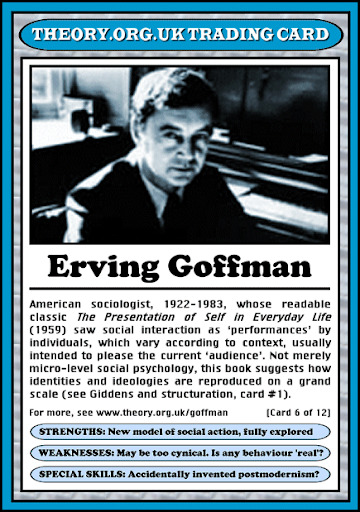
[Special Skills: Accidentally invented postmodernism?]
One of his big theories was dramaturgy, aka the idea that individuals have social ‘personas’ that they act out in everyday life. These performances are intended to convey a certain impression to a given audience. They allow us to manage how others see us.
A big part of this is the concept of front stage/back stage.
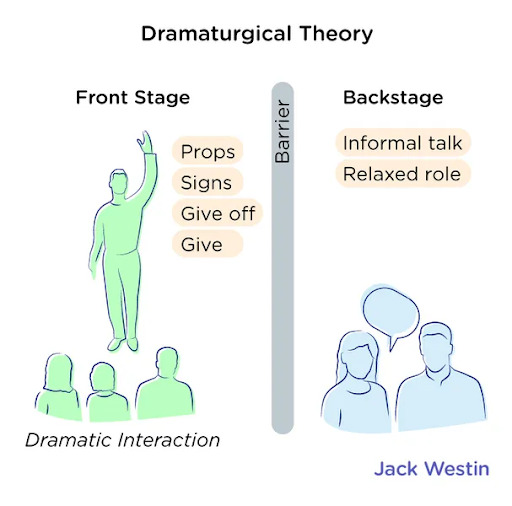
Front stage is the show that we put on for the audience; the intentional impression that we act out and work to provide. The audience, we are aware, is judging this performance and evaluating what kind of person we are.
Back stage is the relaxed, core, true self. It’s the parts of ourselves that we hide, disguise, and choose not to show to an audience, thereby managing their impression of us.
A classic example is customer service, where a helpful friendly persona is put on so that customers feel at ease and accommodated. The workers true feelings towards the customer are hidden in the backstage–the act may or may not be genuine, but the IMPRESSION is given that it is.
The back stage normally comes out when the audience is not perceived as being present to judge an individual’s performance–but what happens if the audience never leaves? What happens, say, if you’re a bodyguard under literally constant surveillance or threat of surveillance?
You might put on your front stage ‘mask’ all the time, to the extent that NO ONE gets to see your back stage. It might seem, even to yourself, that you don’t have one any more. You’re permanently in customer service mode.
You have become the mask, the cardboard cut out version of you that you put in front of your true self.
This really hit me with Pete when he’s breaking down in Ep 13 after Vegas threatens him.
His assertion that he “has no feelings” and even no humanity…
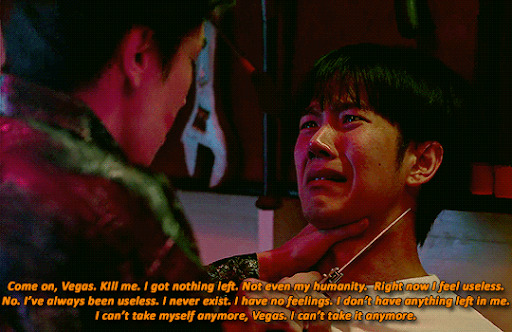
( Image @vegastheerapanyakul )
…is quickly replaced by an equally strong pleading statement to Vegas that he’s human and has feelings.

(Image @liyazaki )
So why the quick turnabout?
My front stage/back stage take is that Pete’s initial statement that he has no feelings and no humanity is all about the front stage that Pete has constructed.
Everyone around Pete (us as the audience included) sees him as relatively one-dimensional for the first ¾ of the season. Pete is friendly, happy, silly, maybe a bit naive, and he lacks depth.
However in the arc with Vegas we learn that this is all a show–Pete has trauma, and soul-deep sadness, and complicated emotions. He’s a fully realized person, but no one ever sees that Pete; he never SHOWS that to anyone (except perhaps Porsche in little doses?).
I think that when Pete says he has no feelings/humanity, he’s referring to the act, the mask, the cardboard cutout version of Pete that is so firmly in place at all times that Pete is afraid that’s who he has BECOME–so afraid he’s ready to die rather than go back to that.
And Vegas threatening him, going back to their earlier dynamic, is shoving Pete back behind that mask. Denying that Vegas has SEEN Pete’s back stage and should KNOW that Pete is more than he first appears.
Pete’s asserting that he DOES have feelings and is human is a reclamation of the fact that he has a back stage, he has depth and complexity and trauma and darkness, and finally, FINALLY someone (Vegas) has seen all of it.
Pete is begging, pleading with Vegas to confirm that–you see me, right? You see that I’m a full, true, complex person. I’m not just your pet, your cardboard cut out version of me.
Don’t make me go back behind the mask–I half believe that’s all I am myself, don’t you believe it too. Not after you’ve seen otherwise, and reminded me to see it too.
(tagging fellow KP social theorist @yeetlegay and my muse @stormyoceans)
#kinnporsche#kinnporsche the series#kinnporsche ep 13#vegaspete#pete saengtham#kinnporsche meta#social theory#me thrown for a loop by pete's I don't have feelings no wait YES I DO: I'm gonna spend SO MUCH TIME THINKING ABOUT SOCIAL THEORY#as always there are likely other good or more correct explanations out there BUT!!!#that's the beauty of social theory is every theory is one LENS you can view a given situation/interaction through#it's not cut and dry ultimate truths#it's interpretations based on theoretical perspectives#anyway....taking of my professor hat now...
179 notes
·
View notes